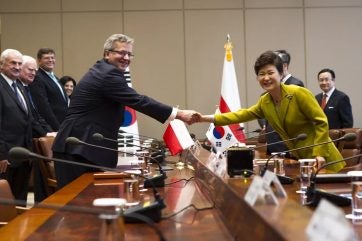
The recent shift in political leadership within Poland has prompted South Korea to proactively engage with the new administration, seeking assurance for the continuity of its defence exports.
Concerns arise as the change in Poland’s leadership casts a shadow on existing defence contracts, particularly the framework agreement signed in 2022, which included orders such as 1,000 K2 Black Panther Main Battle Tanks and 672 K9 Self-Propelled Howitzers.
To counter potential risks stemming from the uncertainty in Polish orders, GlobalData suggests that South Korea is poised to pivot towards diversifying its defence markets in Europe. The goal is to mitigate the impact of any volatility in the Polish market on its defence industry.
In 2023, the global surge in defence procurement, driven by conflicts like the Russo-Ukrainian war and Indo-Pacific tensions, propelled Asia-Pacific nations to the forefront. Notably, South Korea demonstrated industry prowess by securing major European defence contracts, particularly with Poland, which fostered a gateway for neighbouring countries. Despite extensive military build-up and a ‘mixed procurement’ policy, Poland emerged as a top performer, challenging traditional suppliers.
Abhijit Apsingikar, Aerospace and Defence Analyst at GlobalData, highlights the historical context, stating, “Poland’s past decisions, such as overturning a deal with Airbus in 2016, have heightened concerns in South Korea. Yet, a diplomatic fallout with Poland is considered unlikely, given the potential repercussions on various fronts, including industrial cooperation and energy security.”
The framework agreement with Poland encompasses the supply of advanced defence platforms and includes a licensing agreement for domestic manufacturing. However, the unsigned portion of the procurement remains a concern for South Korea, with financing challenges posing a major risk factor.
GlobalData’s report emphasises that South Korea’s defence modernisation efforts have boosted research and development initiatives, enhancing the competitiveness of its defence companies. With this foundation, South Korea aims to expedite efforts to market a range of equipment, including the Cheolmae 2 air defence system, the K239 Chunmoo MLRS, the Light Combat Helicopter, and the KF-21 Boramae, in European markets beyond Poland.
Poland has chosen to deepen its partnership with South Korean suppliers by acquiring 48 of Korea Aerospace Industry’s FA-50 light fighter aircraft, to be produced in a new variant unique to Poland, according to GlobalData’s “Poland Defense Market 2023-2028” report.
As South Korea navigates potential uncertainties in the Polish market, its success in penetrating the Estonian, Norwegian, and Finnish defence markets sets the stage for an accelerated push into other European territories in the coming years.
The diplomatic stakes are high, particularly with South Korean firm Korea Hydro & Nuclear Power Co. shortlisted for critical projects in Poland, underlining the interconnected nature of defence and energy engagements between the two nations.




